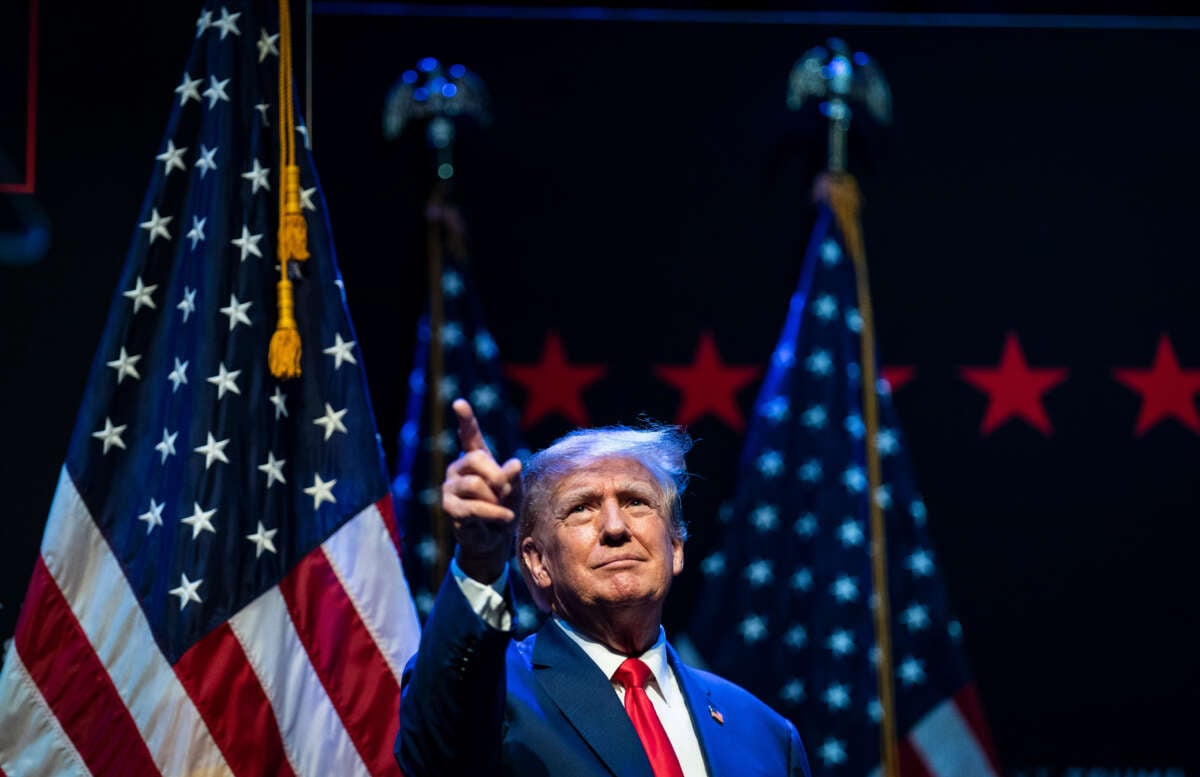In a questionnaire response he sent to Fox News host Tucker Carlson, former President Donald Trump indicated that he felt “regime change” — in other words, a coup d’etat — was presently needed in the United States.
In a segment that aired on Monday evening, Carlson told his viewers that he had sent a questionnaire to several announced and speculated candidates that are (or could soon be) running for the 2024 Republican nomination for president. Within his survey, Carlson asked individuals to share their views on the conflict that was started by Russia’s President Vladimir Putin against Ukraine, and whether the U.S. should be involved in the matter.
Rather than discuss that matter alone, a number of respondents to Carlson’s questionnaire volunteered, without apparent prompting from the Fox News host, their thoughts on regime change in Russia — and whether the U.S. should try to influence a change in leadership in a covert manner. Florida Gov. Ron DeSantis, for example, who described the war between the two nations as a mere “territorial dispute,” said it would be a mistake to do so, fearing that a leader “even more ruthless” than Putin could take charge.
DeSantis also expressed his desire to stop supporting Ukraine in the conflict between the two nations, leading many media outlets to focus on his answers to the questionnaire the following morning. But David Badash, author at The New Civil Rights Movement, said in a column he published after Carlson’s segment that it was Trump’s answer that should have been given more attention.
Trump discussed regime change in Russia, answering that he didn’t want to see the U.S. take part in any attempt to try and oust Putin from power, fearing the repercussions of doing so. But Trump also added that a change in leadership should be sought in this country, through the removal of President Joe Biden.
“We should support regime change in the United States, that’s far more important,” Trump said in his answer, according to Carlson, who read it out loud on his program.
To emphasize the importance of what Trump was calling for, Badash highlighted what the definition of “regime change” meant in his opinion piece that was published on Tuesday.
“‘Regime change,’ as most know, is the removal of a current government, often by force, which could also be called a coup,” Badash wrote. “If you google the definition of ‘regime change,’ you’ll find this: ‘the replacement of one administration or government by another, especially by means of military force.'”
Trump has, at many times since his departure from the White House (following his legitimate election loss to Biden in the 2020 presidential race), suggested that he should be reinstated as president, a move that would defy the rules of the Constitution as well as the will of voters. In the months after Biden was sworn in, for example, many of Trump’s loyalists continued to believe, wrongly, that he’d be reinstated as president, with Trump doing nothing at the time to correct their erroneous assumptions.
Trump has since been more overt in his desire to illegally have himself placed back in the White House — just a few months ago, in December, he called for the temporary “termination” of the Constitution in order to have Biden removed.
Trump’s most infamous example of supporting an attempted usurpation of U.S. democracy is arguably one that he’s currently being investigated for by the Department of Justice — the January 6, 2021, attack on the Capitol building during the certification of Biden’s win. That attack lasted for several hours during which Trump did nothing to quell the violence instigated by him and perpetrated by a mob of his loyalists. As the January 6 committee has suggested, Trump engaged in a “multi-part conspiracy” to remain in office, including his campaign attempting to coordinate and use fake electors in the Electoral College in order to disrupt the certification process.
According to the committee’s final report, Trump had summoned his supporters to Washington D.C. that day, and, despite knowing some of them to be armed, instructed them to march to the Capitol, to “take back” their country with “strength.”
Trump is continuing to use rhetoric urging his followers to engage in violent actions in order to get him back into the White House. In February, he amplified a user on Truth Social, sharing their post that called on people to “physically fight” for him to win the GOP nomination in 2024.
Join us in defending the truth before it’s too late
The future of independent journalism is uncertain, and the consequences of losing it are too grave to ignore. To ensure Truthout remains safe, strong, and free, we need to raise $43,000 in the next 6 days. Every dollar raised goes directly toward the costs of producing news you can trust.
Please give what you can — because by supporting us with a tax-deductible donation, you’re not just preserving a source of news, you’re helping to safeguard what’s left of our democracy.
